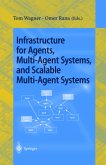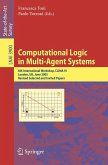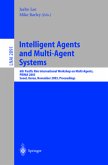This book constitutes the thoroughly refereed post-proceedings of the Second International Workshop on Declarative Agent Languages and Technologies, DALT 2004, held in New York, NY, USA in July 2004.
The 16 revised full papers presented were carefully selected during two rounds of reviewing and improvement from initially around 40 submissions. The papers are organized in topical sections on reasoning, modeling and engineering, verification, norms and protocols, and interaction and communication.
The second edition of the workshop on Declarative Agent Languages and Te- nologies (DALT 2004) was held July 2004 in New York City, and was a great success. We saw a signi?cant increase in both the number of submitted papers and workshop attendees from the ?rst meeting, held July 2003 in Melbourne. Nearly 40 research groups worldwide were motivated to contribute to this event by submitting their most recent research achievements, covering a wide variety of the topics listed in the call for papers. More than 30 top researchers agreed to join the Program Committee, which then collectively faced the hard task of selecting the one-day event program. The fact that research in multi-agent systems is no longer only a novel and promising research horizon at dawn is, in our opinion, the main reason behind DALT's (still short) success story. On the one hand, agent theories and app- cations are mature enough to model complex domains and scenarios, and to successfully address a wide range ofmultifaceted problems, thus creating the urge to make the best use of this expressive and versatile paradigm, and also pro?t from all the important results achieved so far. On the other hand, bui- ing multi-agent systems still calls for models and technologies that could ensure system predictability, accommodate ?exibility, heterogeneity and openness, and enable system veri?cation.
Hinweis: Dieser Artikel kann nur an eine deutsche Lieferadresse ausgeliefert werden.
The 16 revised full papers presented were carefully selected during two rounds of reviewing and improvement from initially around 40 submissions. The papers are organized in topical sections on reasoning, modeling and engineering, verification, norms and protocols, and interaction and communication.
The second edition of the workshop on Declarative Agent Languages and Te- nologies (DALT 2004) was held July 2004 in New York City, and was a great success. We saw a signi?cant increase in both the number of submitted papers and workshop attendees from the ?rst meeting, held July 2003 in Melbourne. Nearly 40 research groups worldwide were motivated to contribute to this event by submitting their most recent research achievements, covering a wide variety of the topics listed in the call for papers. More than 30 top researchers agreed to join the Program Committee, which then collectively faced the hard task of selecting the one-day event program. The fact that research in multi-agent systems is no longer only a novel and promising research horizon at dawn is, in our opinion, the main reason behind DALT's (still short) success story. On the one hand, agent theories and app- cations are mature enough to model complex domains and scenarios, and to successfully address a wide range ofmultifaceted problems, thus creating the urge to make the best use of this expressive and versatile paradigm, and also pro?t from all the important results achieved so far. On the other hand, bui- ing multi-agent systems still calls for models and technologies that could ensure system predictability, accommodate ?exibility, heterogeneity and openness, and enable system veri?cation.
Hinweis: Dieser Artikel kann nur an eine deutsche Lieferadresse ausgeliefert werden.








